Iran Should Have Been More Active

Gholam Hossein Hassantash: In my opinion, OPEC's decision during its 161st session on June 14, 2012, was not a good one. I think Saudi Arabia introduced the issue of an increase in production and wanted to impose this idea on the session in order not to be pushed to accept a reduction of production. Why is this decision bad? Because it does not correspond to the situation in the oil market. The demand for oil is low because of the crises and economic recession in Western industrial countries. The continuation of the crises in Europe has caused people's economic weakness, and a decrease in travel and oil consumption. There is an extra supply in the gas market too, which adversely affects the oil market. On the other hand, Iraqi oil production is on the rise and Libyan production, which used to be off the market, has reached previous records. Oil production from non-customary sources in North America has increasingly been on the rise. All of these have caused oil prices during recent weeks to have a decreasing trend and, under these circumstances, OPEC had to reduce its production ceiling in order to prevent a further downward trend in prices. Under the present market situation, the Iranian Oil Ministry, in cooperation with the Ministry of Foreign Affairs, and from many days before the session and particularly from the time the trend of prices was to fall, should have been more active to create a faction in support of the reduction of production in order to put pressure on Saudi Arabia. Psychological issues affect the oil market quite a bit. Had OPEC decided to impose some small reduction in production, the prices would have immediately increased. The present situation is difficult for Iran because its production and its exports have reduced, and oil prices are in a falling trend.
ID: Taking into consideration that some countries do not observe their quotas, how does OPEC deal with these countries?
GH: Unfortunately, OPEC decisions have no implementation guarantee. In other words, OPEC has no policing ability and violators are not punished. Only sometimes, before a session, the supervision committee of the OPEC market convenes and cautions different countries. The statement of this session has referred to the report of this committee, but the names of violating countries have not been mentioned.
ID: The issue of oil sanctions on Iran was supposed to be discussed in this session. What is the position of OPEC vis-a-vis this issue? How does OPEC react to efforts of countries like Saudi Arabia who have been active in this regard?
GH: I find it unlikely that the issue of sanctions against Iran was on the agenda of this session. OPEC does not usually deal with these issues, especially ones related to political issues. Agendas of OPEC sessions are clear: studying the oil market and decision-making on the production ceiling. As far as Saudi Arabia is concerned, this country has always supported the interests of consuming countries and has tried to influence OPEC decisions. Whenever it has not been successful in this regard, it has not followed OPEC decisions. In the course of Libya's departure from the world oil market, Saudi Arabia did its best to compensate for that. It is now working to compensate for the reduction of Iranian oil, which is practically tantamount to cooperation with sanctions against Iran.
ID: What have the discussions in this session been with regard to the election of the OPEC Secretary-General?
GH: This session was supposed to discuss the election of the Secretary-General, which has apparently been postponed until the next session. Iran introduced its candidate for this position late. However, with this delay, Iran has six more months to lobby for this position. Saudi Arabia has also introduced a candidate. Iran's Foreign Ministry and Oil Ministry should be active not to allow Saudi Arabia to secure this position. Saudi Arabia's high production capacity has effectively given supremacy to this country in OPEC. If the Secretary-General is going to be from Saudi Arabia, OPEC will be, more than before, at the service of the interests of consuming countries and this will not be beneficial for OPEC and its members. The Secretary-General is elected for a three-year term, one of which can be extended for another three years. This extension is usually done more easily than the election of a new Secretary-General. Therefore, one should look at this issue as a long-term issue. It should not probably be considered as short-lived gives and takes, especially when we are in the last year of the current Iranian government and it is possible that, if we give such a privilege to Saudi Arabia, there will not be time to receive anything in return.

